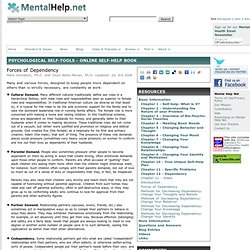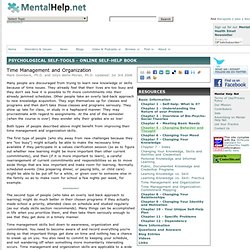

Forces of Dependency. Mark Dombeck, Ph.D. and Jolyn Wells-Moran, Ph.D.

Updated: Jul 3rd 2006 Many and various forces, designed to keep people more dependent on others than is strictly necessary, are constantly at work: Cultural Demand. Many different cultures traditionally define sex roles in a hierarchical fashion, with male roles and responsibilities seen as superior to female roles and responsibilities. In traditional American culture (as diverse as that beast is), it is typical for the male to be the sole economic support for the family and to take the dominant leadership role in running family affairs. Dependency is not a bad thing in of itself, but it can become a bad thing when adults are too dependent on others to meet their needs.
Self-Control. I have these exact symptoms - - Apr 3rd 2009 what help did you get, clear out - little pile - Jan 19th 2009 stop eating all carbohydrates! Bipolar (mood disorder) - charmaine - Sep 10th 2008 I have become very dependent due to my illness and also very insecure. Using the new Positive Psychology. Time Management & Organization Skills, Improvement & Help. Mark Dombeck, Ph.D. and Jolyn Wells-Moran, Ph.D.

Updated: Jul 3rd 2006 Many people are discouraged from trying to learn new knowledge or skills because of time issues. They already feel that their lives are too busy and they don't see how it is possible to fit more commitments into their already jammed schedules. Other people take an overly laid-back approach to new knowledge acquisition. They sign themselves up for classes and programs and then don't take those classes and programs seriously. Both types of people described above might benefit from improving their time management and organization skills. The second type of people (who take an overly laid back approach to learning) might do much better in their chosen programs if they actually made school a priority, attended class on schedule and studied regularly (as our study skills section recommends).
Time management skills boil down to awareness, organization and commitment. Memory Improvement Techniques - Improve Your Memory with MindTools. © VeerPRZEMYSLAW PRZYBYLSKI Use these techniques to improve your memory. The tools in this section help you to improve your memory. They help you both to remember facts accurately and to remember the structure of information.
The tools are split into two sections. Firstly you'll learn the memory techniques themselves. As with other mind tools, the more practice you give yourself with these techniques, the more effectively you will use them. Mnemonics 'Mnemonic' is another word for memory tool. The idea behind using mnemonics is to encode difficult-to-remember information in a way that is much easier to remember. Our brains evolved to code and interpret complex stimuli such as images, colors, structures, sounds, smells, tastes, touch, positions, emotions and language. Unfortunately, a lot of the information we have to remember in modern life is presented differently – as words printed on a page.
Using Your Whole Mind to Remember Use positive, pleasant images.